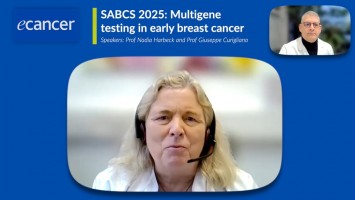IBCD 2016 - Innovation and biomarkers in cancer drug development
NCI’s precision medicine initiatives
Dr Shakun Malik - National Cancer Institute, USA
We had a session yesterday where we discussed the challenges in the clinical trials as well as from the regulatory point of view in the era of personalised medicine. What we discussed in the session and what came out of it was that it has been challenging for patients to understand what personalised medicine is and how that can be applied to them. While we are in the clinical trials many multiple cancers, for example lung cancer that was only divided into small cell and non-small cell, has now multiple small fragments where we have molecularly defined subsets. So when you are doing clinical trials to accrue the patients to the clinical trials with these smaller subsets has made it very challenging so we now have to do clinical trials where we can’t afford to or don’t have a way to have large randomised phase III trials where we now have smaller subsets and we then tried these molecularly targeted therapies and we have to challenge the regulatory methods by means of which or we have new regulatory methods by means of which these drugs are approved.
Can you tell us about the NCI’s precision medicine initiatives?
There are a number of personalised medicine initiatives in the US as well as in Europe and other countries. In the US NCI, not mentioning that there are a large number of initiatives, and a few of them that were discussed yesterday was exceptional responders where what we do is that any physician, if they noticed a patient has exceptionally done well compared to patients who have similar disease. For example, recently I saw a small cell lung cancer patient who had complete response for over five years so that’s unheard of in small cell. So then the patient’s physician sent us the history of that patient and we, as a panel plus the two experts, reviewed the patient’s history and then we, as a panel, made a decision that this was an exceptional response. In that case the physician will now send us the pathology and the tissue block where we are going to be doing the next gen sequencing and we will learn from these exceptional responders. Why are these patients who are responding while most of the patients in this disease don’t.
The second initiative from NCI that we discussed yesterday is MATCH. This trial we are screening a large number of patients, the goal is to screen about 5,000, where then we match their genetic abnormalities from the tumour to the treatment arms that are available to them. So that is ongoing at this time.
We also have two initiatives that are ongoing for lung cancer, one is Lung-MAP which is a trial that is in squamous cell lung cancer in patients who have progressed on at least one line of therapy. Again, these patients have tissue that is examined for genetic abnormalities and then they are matched to the arm that is available for the drug that actually blocks that abnormality which is thought to be the driver for the cancer in their case. We have, over the years, changed some of the strategies in Lung-MAP based on now immunotherapies that are available.
The last trial that we discussed was the ALCHEMIST trial, again an NCI initiative. This is for early stage lung cancer, squamous as well as non-squamous. It started for non-squamous alone, after adjuvant therapies and resection of lung cancer the patients were given EGFR therapy or ALK therapy based on their tumour genetics but recently we have added an immunotherapy arm to that trial.
So in this way, in these platforms for NCI, it has been challenging as well as interesting in the sense that as the science move forwards, because of the flexibility of these platforms we were able to modify these trials where we could actually keep up with the pace of the science.
Could you shed some light on the debate that is happening around personalised medicine?
The debate is not whether personalised medicine is good or bad, the debate is that where we are learning about the personalised medicine are we ready that we treat these patients off label where we don’t have enough evidence and collect the information on what is happening out in the real world? Or should we not be doing that, should we be putting all these patients on clinical trials until we have enough evidence that these are the right targets that we are hitting and making really clinically meaningful outcomes in the patient care.
What is your personal take on this?
I think it has good points and bad points as the debate is going. So the good points for the real world is that a lot of patients get treated out there, if we don’t collect that data then we will not know what’s really happening in the real world. On the other hand, I really strongly feel that we should make every effort to put patients on clinical trials and this is the right way of learning whether these treatments are effective or not. But I also do understand that when you do clinical trials you do it and the eligibility criteria is so stringent and they may not give you enough information or not give you the same information as you may collect when they are given in the real world population. So it has both good and not so good points.
How have you found the IBCD 2016 conference so far?
This has been a very exciting and a learning conference and has had a lot of debate that has been ongoing and has been very productive for me.








